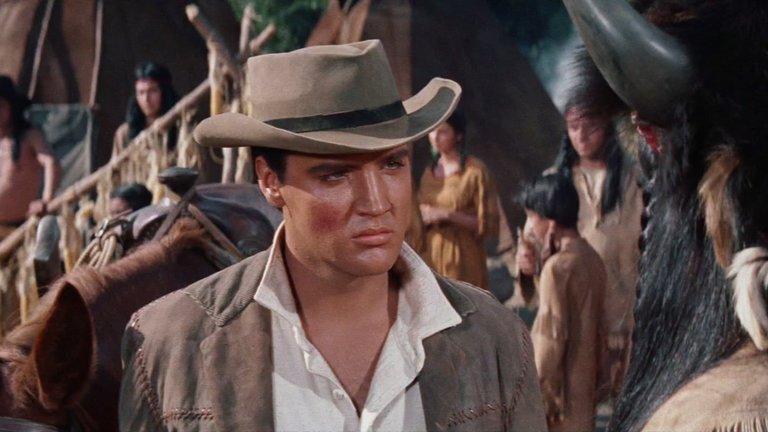
Elvis Presley is widely regarded as the greatest musical icon of the 20th century, yet his film career left plenty to be desired. The majority of his cinematic efforts are largely forgotten, particularly the musical comedies that dominated his filmography, and, unlike his timeless songs, were often dismissed as trivial by contemporary audiences. Moreover, Presley's acting abilities were frequently mocked by his peers. However, there existed a latent talent within him that, under the guidance of a skilled director or in a more suitable role, could have led to many great things. The individual who came closest to unlocking this potential was Don Siegel, the director of Flaming Star (1960). In this Western, Presley delivered what many critics consider to be his finest performance.
Set in 19th Century Texas, Flaming Star follows Pacer Burton, portrayed by Presley. Pacer is the son of a white farmer, Sam Burton (played by John McIntire), and Neddy (playewd by Dolores del Rio), a Kiowa woman. He lives with his older white stepbrother Clint (played by Steve Forrest) on their family farm. Initially indifferent to his mixed heritage, Pacer's life takes a dramatic turn when Kiowa war parties led by Buffalo Horn (played by Rodolfo Acosta) begin attacking and massacring white settlers. Buffalo Horn spares Pacer's farm with the hope of persuading him to join his mother's tribe. Reluctantly caught in a web of racial tension and violence, Pacer becomes a target for abuse from his white neighbours. This ignites a deep-seated resentment within him as he grapples with the increasingly violent conflict between two cultures.
The film is based on Clair Huffaker's 1958 novel Flaming Lance, an author known for crafting notable Western scripts. Despite its relatively straightforward plot, Flaming Star resonates with themes that were particularly relevant during its release. The film critiques racism—a pressing issue amidst the civil rights movement—and hints at paranoia surrounding communism, with references to "Reds" echoing the McCarthy-era persecutions.
However, for all its progressive intentions, the script occasionally succumbs to more conservative tropes regarding mixed-race identities. The notion that being a "half-breed" leads to tragic outcomes is prevalent throughout the film, culminating in melodramatic events that strip Pacer of his loved ones and force him into shifting allegiances. This narrative arc ultimately leads to a tragic resolution that reinforces outdated stereotypes rather than challenging them.
On the other hand, any political commentary or deeper thematic explorations were largely undermined by Colonel Tom Parker, Presley's infamous manager who served as a "technical advisor" on the film. Parker's influence ensured that Flaming Star adhered to the formulaic structure typical of Presley's films—where music took precedence over narrative substance. Although Presley performs two songs in the film—one during the opening credits and another at a birthday party scene at the very beginning—these musical interludes feel shoehorned into an otherwise serious story.
Produced by 20th Century Fox on a limited budget, Flaming Star exhibits some rough edges visually. The film suffers from glaringly obvious "day for night" scenes that detract from its overall quality and give it an unpolished appearance. Nevertheless, Siegel manages to direct several compelling action sequences that inject energy into the film. Notably, fans of Presley are treated to moments where he appears shirtless, showcasing not only his physicality but also hinting at the raw emotion he brings to his role.
While Presley may not rival acting legends like Marlon Brando in terms of talent, he approached his role in Flaming Star with sincerity and conviction. His portrayal of Pacer Burton—a young man increasingly consumed by anger and conflict—demonstrates an emotional range that had been largely absent from most of his other film performances. Critics often cite this role as one of Presley's best; it encapsulates a rebellious spirit that he had somewhat diluted in favour of mainstream appeal during the 1960s.
In terms of performance, Presley stands out significantly from his co-stars. While veterans like John McIntire and Dolores del Rio deliver commendable performances as Pacer's parents, other cast members fall flat in comparison. Barbara Eden's role as Clint's girlfriend feels particularly underdeveloped; she serves merely as an obligatory female presence without leaving a lasting impression—her eventual rise to fame on television underscores this point.
Ultimately, Flaming Star emerges as a solid yet unremarkable film that may appeal primarily to dedicated fans of Elvis Presley or those sceptical about his potential as an actor.
RATING: 5/10 (++)
Blog in Croatian https://draxblog.com
Blog in English https://draxreview.wordpress.com/
InLeo blog https://inleo.io/@drax.leo
Hiveonboard: https://hiveonboard.com?ref=drax
Rising Star game: https://www.risingstargame.com?referrer=drax
1Inch: https://1inch.exchange/#/r/0x83823d8CCB74F828148258BB4457642124b1328e
BTC donations: 1EWxiMiP6iiG9rger3NuUSd6HByaxQWafG
ETH donations: 0xB305F144323b99e6f8b1d66f5D7DE78B498C32A7
BCH donations: qpvxw0jax79lhmvlgcldkzpqanf03r9cjv8y6gtmk9
Posted Using InLeo Alpha